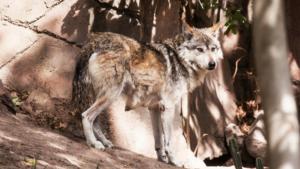For Immediate Release—August 17, 2020
Contact: Jocelyn Leroux, Western Watersheds Project, (406) 960-4164, jocelyn@westernwatersheds.org
SEATTLE, Wash.—The Washington Department of Fish and Wildlife has again deferred to ranchers in their state wildlife management. Today we learned that the remaining two members of the Wedge wolf pack in northeast Washington were slaughtered by the Department. The news comes after an adult, non-breeding female member of the pack was killed by the Department on July 27.
“The destruction of yet another wolf pack at the behest of livestock producers is an outrage,” said Jocelyn Leroux, Washington and Montana Director for Western Watersheds Project. “The Department is charged with protecting native wildlife, particularly those listed under the state’s Endangered Species Act, yet has gone out of its way to continue murdering members of this state endangered species.”
The Department claimed that numerous nonlethal conflict prevention measures were employed proactively as well as reactively following early livestock depredations. However, one of the main measures that was relied upon was the use of “range riders,” a vague term that has only recently been defined by the Department. For one affected producer, range riders present for 14 of 32 days between May 21 and June 18, and not even for all of those 14 days. They were only present for 6 full days and 8 partial days.
“The fact that the Department considers this as one of their nonlethal deterrents is unacceptable,” said Jocelyn Leroux. “Having ‘intensified’ range riding to include four days a week with the greatest gap being two days not only doesn’t logically or numerically make sense but is clearly not adequate.”
The Department relies heavily on livestock producers to remove sick or injured livestock “when discovered,” yet numerous wolf updates state that it takes days and sometimes weeks for producers or range riders to notice injuries.
“Leaving injured livestock and carcasses out on public lands for extended periods in wolf country is a clear violation of the wolf-livestock interaction protocol, as well as the Wolf Conservation and Management Plan as it amounts to baiting wolves,” said Leroux.
The Department recently asked the Fish and Wildlife Commission to deny a petition for rulemaking that would have specific requirements prior to the lethal removal of wolves.
“The Department’s trigger-happy wolf management program needs to change,” said Leroux “Wolf management can no longer be governed by livestock producers who are a small minority of Washingtonians.”
Western Watersheds Project, WildEarth Guardians, the Public Lands Council, and Kettle Range Conservation Group are currently suing to challenge the legality of cattle grazing under the Colville National Forest’s land-use plan.






